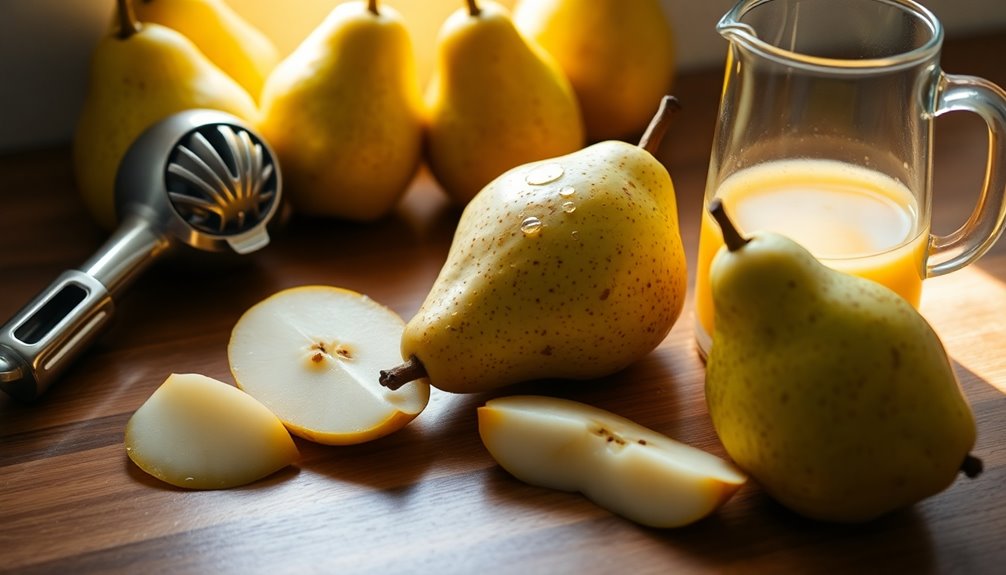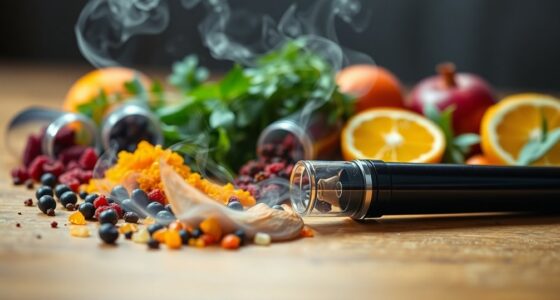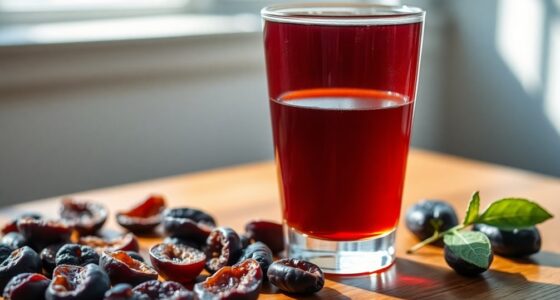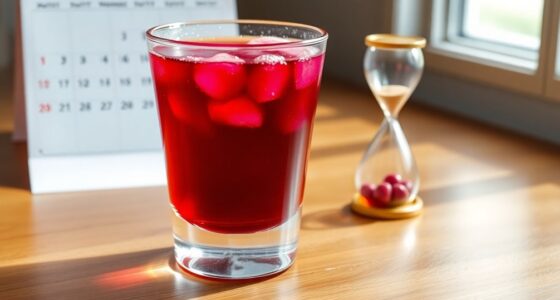To juice pears, start by selecting ripe, aromatic Asian pears. Wash them thoroughly, then peel and quarter. You can blend the chopped pears with chilled water, adding a splash of lemon juice or ginger for extra flavor. Strain the mixture through a fine mesh strainer or use a juicer directly. Enjoy your fresh juice immediately for the best taste and nutrition. If you're interested in tips for enhancing your juice, keep exploring further!
Key Takeaways
- Select ripe, aromatic Asian pears, ensuring they are firm and free from spoilage for the best juicing experience.
- Wash, peel, and quarter the pears, removing any seeds to optimize juice clarity and flavor.
- Use a blender with chilled water or a juicer to extract juice from the prepared pears.
- Enhance flavor by adding lemon juice, ginger, or combining with other fruits like oranges.
- Consume fresh pear juice immediately or refrigerate for up to four days for optimal taste and nutrition.

Juicing pears is a delicious way to enjoy their sweet, refreshing flavor. If you've got some ripe Asian pears on hand, you're in for a treat! When it comes to making homemade pear juice, the first step is selecting the right pears. Look for those that are ripe and aromatic; they'll yield the juiciest results.
Once you've got your pears, wash them thoroughly to remove any dirt or residue. After that, peel and quarter them to prepare for juicing.
There are two primary methods for juicing pears: using a blender or a juicer. If you choose to use a blender, you'll want to blend your chopped pears with chilled water. This helps achieve a smoother texture and makes it easier to strain. You might also consider adding a splash of lemon juice or a hint of ginger to enhance the flavor of your fresh pear juice. The acidity from the lemon juice not only brightens the taste but also adds a boost of vitamin C, making your homemade pear juice even healthier.
Once you've blended the pears and water together, strain the mixture through a nut milk bag or fine mesh strainer. This will separate the juice from the pulp, leaving you with a refreshing drink.
On the other hand, if you have a juicer, the process is even simpler. Just quarter your ripe pears and feed them directly into the juicer. You can also combine them with other fruits, like oranges, to create a delightful blend of flavors. This method gives you a smooth, delicious pear juice that's hard to resist.
Regardless of the method you choose, the result is a fresh and tasty drink that showcases the natural sweetness of the pears.
It's important to remember that pear juice is best enjoyed immediately after juicing. Freshly prepared pear juice not only tastes better but also retains its nutritional value, reducing the risk of oxidation. However, if you need to store your homemade pear juice, you can keep it in the refrigerator for up to four days. Just keep in mind that for the best flavor and health benefits, you should consume it as soon as possible.
When you follow this pear juice recipe, you'll end up with a delicious pear juice that's perfect for sipping on a warm afternoon or using in smoothies and cocktails.
Frequently Asked Questions
How to Get Juice From a Pear?
To get juice from a pear, start by choosing ripe Asian pears for their juiciness.
Wash and peel them, then remove the core and seeds. Cut the pears into smaller pieces.
If you're using a blender, blend the pieces with chilled water until smooth, then strain it. If you have a juicer, simply feed the quartered pears into it.
Enjoy the fresh juice right away or store it in the fridge for up to four days.
Do I Need to Peel Pears Before Juicing?
Juicing pears is like painting a canvas; you can choose to leave the skin on or peel it off.
You don't need to peel organic pears, as their skin's packed with nutrients. However, if you're using non-organic ones, give them a good wash.
Peeling can enhance flavor and texture, but always remove the core and seeds.
If you're blending, peeling's optional, but straining will help create a smoother juice.
Are Pears Good for Juicing?
Yes, pears are great for juicing! Their high water content makes them juicy and refreshing, perfect for a delicious drink.
You'll benefit from their vitamins and antioxidants, which can support your health. Plus, juicing pears can help with cholesterol levels and digestive issues.
If you want to enhance the flavor, try mixing them with other fruits like ginger or oranges. You'll love the tasty combinations you can create!
How to Cut a Pear for Juicing?
To cut a pear for juicing, start by rinsing it under cool water to clean off any dirt.
Next, slice off the top and bottom to create a stable base.
Halve the pear lengthwise, then quarter each half to make it easier to remove the core and seeds.
Use a small knife or spoon to scoop out the core, leaving just the flesh, and chop it into smaller pieces for easier blending.
Conclusion
Juicing pears is not just a delicious way to enjoy this sweet fruit; it's also a healthy choice. Did you know that one medium pear contains about 5.5 grams of fiber, which is nearly 22% of the daily recommended intake? By juicing pears, you can capture that natural goodness while creating a refreshing drink. So, grab those ripe pears and start juicing—your taste buds and your body will thank you! Enjoy the nutritious benefits in every sip!
Cindy thoroughly researches juicing trends, techniques, and recipes to provide readers with practical advice and inspiration. Her writing style is accessible, engaging, and designed to make complex concepts easy to understand. Cindy’s dedication to promoting the advantages of juicing shines through her work, empowering readers to make positive changes in their lives through the simple act of juicing.











